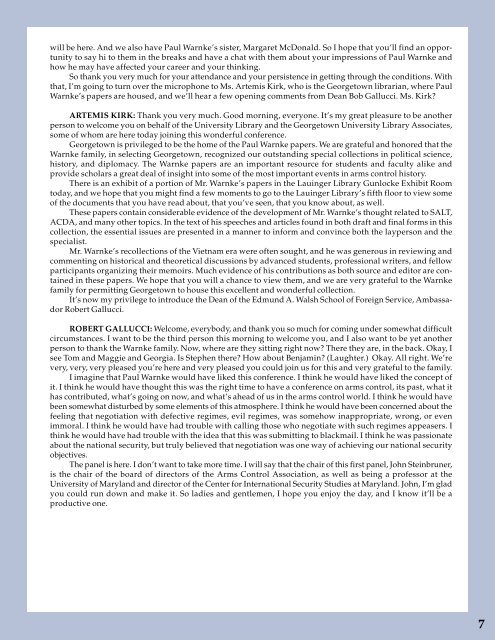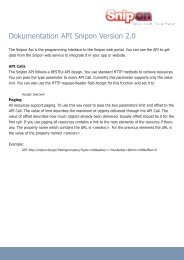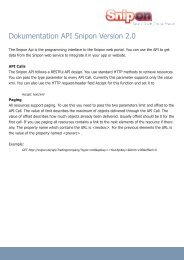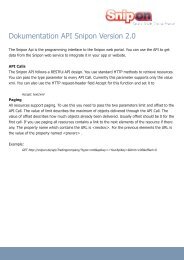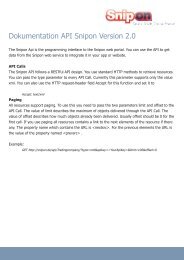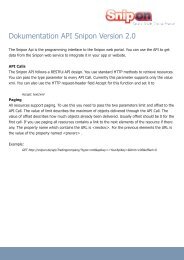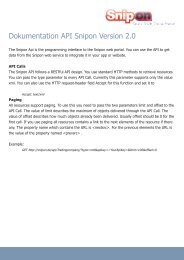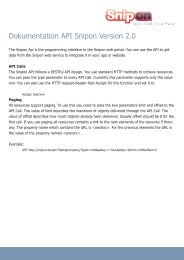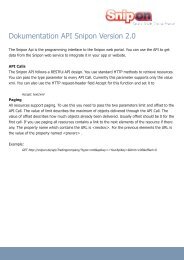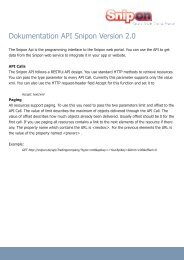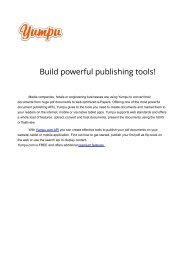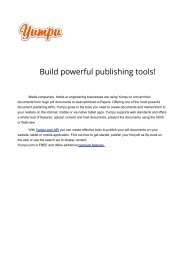test_pdf.pdf
Create successful ePaper yourself
Turn your PDF publications into a flip-book with our unique Google optimized e-Paper software.
will be here. And we also have Paul Warnke’s sister, Margaret McDonald. So I hope that you’ll find an opportunity<br />
to say hi to them in the breaks and have a chat with them about your impressions of Paul Warnke and<br />
how he may have affected your career and your thinking.<br />
So thank you very much for your attendance and your persistence in getting through the conditions. With<br />
that, I’m going to turn over the microphone to Ms. Artemis Kirk, who is the Georgetown librarian, where Paul<br />
Warnke’s papers are housed, and we’ll hear a few opening comments from Dean Bob Gallucci. Ms. Kirk?<br />
ARTEMIS KIRK: Thank you very much. Good morning, everyone. It’s my great pleasure to be another<br />
person to welcome you on behalf of the University Library and the Georgetown University Library Associates,<br />
some of whom are here today joining this wonderful conference.<br />
Georgetown is privileged to be the home of the Paul Warnke papers. We are grateful and honored that the<br />
Warnke family, in selecting Georgetown, recognized our outstanding special collections in political science,<br />
history, and diplomacy. The Warnke papers are an important resource for students and faculty alike and<br />
provide scholars a great deal of insight into some of the most important events in arms control history.<br />
There is an exhibit of a portion of Mr. Warnke’s papers in the Lauinger Library Gunlocke Exhibit Room<br />
today, and we hope that you might find a few moments to go to the Lauinger Library’s fifth floor to view some<br />
of the documents that you have read about, that you’ve seen, that you know about, as well.<br />
These papers contain considerable evidence of the development of Mr. Warnke’s thought related to SALT,<br />
ACDA, and many other topics. In the text of his speeches and articles found in both draft and final forms in this<br />
collection, the essential issues are presented in a manner to inform and convince both the layperson and the<br />
specialist.<br />
Mr. Warnke’s recollections of the Vietnam era were often sought, and he was generous in reviewing and<br />
commenting on historical and theoretical discussions by advanced students, professional writers, and fellow<br />
participants organizing their memoirs. Much evidence of his contributions as both source and editor are contained<br />
in these papers. We hope that you will a chance to view them, and we are very grateful to the Warnke<br />
family for permitting Georgetown to house this excellent and wonderful collection.<br />
It’s now my privilege to introduce the Dean of the Edmund A. Walsh School of Foreign Service, Ambassador<br />
Robert Gallucci.<br />
ROBERT GALLUCCI: Welcome, everybody, and thank you so much for coming under somewhat difficult<br />
circumstances. I want to be the third person this morning to welcome you, and I also want to be yet another<br />
person to thank the Warnke family. Now, where are they sitting right now? There they are, in the back. Okay, I<br />
see Tom and Maggie and Georgia. Is Stephen there? How about Benjamin? (Laughter.) Okay. All right. We’re<br />
very, very, very pleased you’re here and very pleased you could join us for this and very grateful to the family.<br />
I imagine that Paul Warnke would have liked this conference. I think he would have liked the concept of<br />
it. I think he would have thought this was the right time to have a conference on arms control, its past, what it<br />
has contributed, what’s going on now, and what’s ahead of us in the arms control world. I think he would have<br />
been somewhat disturbed by some elements of this atmosphere. I think he would have been concerned about the<br />
feeling that negotiation with defective regimes, evil regimes, was somehow inappropriate, wrong, or even<br />
immoral. I think he would have had trouble with calling those who negotiate with such regimes appeasers. I<br />
think he would have had trouble with the idea that this was submitting to blackmail. I think he was passionate<br />
about the national security, but truly believed that negotiation was one way of achieving our national security<br />
objectives.<br />
The panel is here. I don’t want to take more time. I will say that the chair of this first panel, John Steinbruner,<br />
is the chair of the board of directors of the Arms Control Association, as well as being a professor at the<br />
University of Maryland and director of the Center for International Security Studies at Maryland. John, I’m glad<br />
you could run down and make it. So ladies and gentlemen, I hope you enjoy the day, and I know it’ll be a<br />
productive one.<br />
7<br />
7


